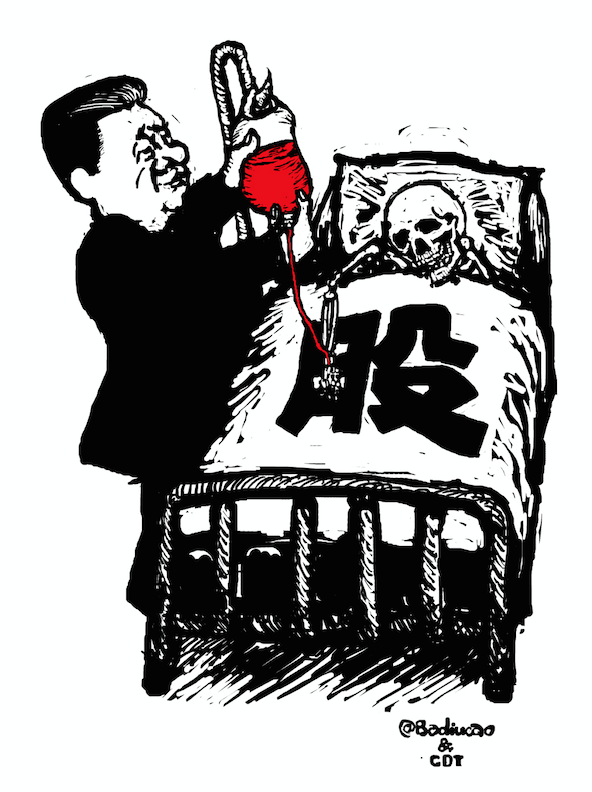The following censorship instructions, issued to the media by government authorities, have been leaked and distributed online.
SAPPRFT: Radio and television stations must substantially cut down on coverage of the stock market and strictly observe the following rules:
- Necessary coverage of the stock market must be completely balanced, objective, and rational. Do not join the chorus of the bull or bear market. Rationally lead market expectations to prevent inappropriate reports from causing the market to spike or crash.
- Without exception, discontinue discussions, expert interviews, and on-site live coverage. Do not conduct in-depth analysis, and do not speculate on or assess the direction of the market. Do not exaggerate panic or sadness. Do not use emotionally charged words such as “slump,” “spike,” or “collapse.”
- Strictly report according to information released by the China Securities Regulatory Commission. Resolutely avoid promulgating false information.
- Programs on securities must be produced and broadcast by the broadcast organization. Do not rent or transfer time slots, do not broadcast programs produced by consulting organizations, and do not embark on commercial ventures with consulting organizations. (June 23, 2015) [Chinese]
This recently obtained directive was issued last month during a headlong plunge in China’s stock markets. The dive may now have ended, but only after the government resorted to more direct interventions than media management and appeals to patriotism. With trading in at least $2.6 trillion worth of shares suspended, freezing almost half the market by value, regulators banned major stockholders from selling shares and ordered state-owned and listed companies and their employees to buy more. The Financial Times’ Patrick McGee wrote that the authorities “made it all-but-impossible for the market to continue sliding. Indeed, some question whether ‘market’ is even the right word any more. […] So, yes, the Shanghai market had a great day. But it didn’t stage a recovery. A recovery was staged.”
Many have speculated that the government’s apparently panicked handling of the crash could dent its domestic and global credibility, while strengthening putative internal opposition and angering the more than 80 million individual investors who answered its earlier calls to invest. The Economist commented on Thursday:
Just as the Communist Party distrusts market forces, so it misunderstands them. Botched attempts to save stocks suggest it is losing control, while a successful rescue would have made buying shares a one-way bet—inflating the bubble still further. One of the persistent illusions about China’s governance is that, whatever its other shortcomings, eminently capable technocrats are in control. Their haplessness in the face of the market turmoil points to a more disconcerting reality. [Source]
Naturally, the government is not just meekly accepting blame. Last week, a controversially expansive new National Security Law designated the financial sector, seabeds, and outer space as territories in need of defense against internal and external threats. In keeping with this, China’s public security apparatus has been mobilized in the wake of the crisis. From Bloomberg:
The Ministry of Public Security said it will help the China Securities Regulatory Commission investigate evidence of “malicious” short selling of stocks and indexes, according to a statement on its website Thursday. Vice Public Security Minister Meng Qingfeng visited the regulator’s offices in Beijing on Thursday, the official Xinhua News Agency said earlier on its microblog.
The move comes after the securities regulator pledged to “strictly” punish market manipulation and China’s state-run media blamed short selling, rumor-mongering and foreign meddling for fueling the stock slide. […]
“If you sell huge amounts of stock on the spot market and sell lots of futures contracts, then you’ll probably be a ‘malicious short seller,’” said Jiang Lin, an analyst at Xinhu Futures Co. in Shanghai. “They will probably investigate a few accounts with big amounts of money and catch some as typical examples.” [Source]
Same friends in China (half) joke that now Public Security Ministry has gotten involved, people are afraid if they sell they'll be arrested.
— Patrick Chovanec (@prchovanec) July 10, 2015
As for immediate fallout across the rest of China’s economy, The Economist suggested elsewhere that “mercifully, the stockmarket appears to be as disconnected from economic fundamentals on the way down as it was on the way up.” But both it and U.S. Treasury Secretary Jacob Lew expressed a widespread concern at the possible derailment of reforms seen as necessary in the longer term.









